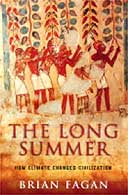
The Long Summer: How Climate Changed Civilisation
by Brian Fagan
284pp, Granta, £20
The more you find out about global warming, the more you realise there are two characteristics of climate change: immense complexity and terrible inevitability. The complexity is perhaps the harder of the two to comprehend. Climate change has major relevance to widely differing areas of our lives. Science, business, agriculture, politics, tourism, society, nature and so on, and even within these fields there are gulfs of divided opinion, conflicting evidence, setting of priorities, clashings of vested interests, nay-saying, jeremiads and ruthless indifference.
The world's largest polluter (the US) not only refuses to ratify the Kyoto protocol, but Alaska, one of its largest states and a major oil-producer, is losing its icefields, sinking into its melting permafrost, allowing its wildlife to be destroyed, and pumping millions of barrels of crude. None of the oil is exported: it all goes to fuel the greenhouse emissions from the profligate American use of cars, air conditioners, ice-makers and jet aircraft. Meanwhile, the world's second largest polluter (China) is losing immense tracts of land to desert as drought takes hold, while expanding its industrial base faster than any other country in the world. With dread cause and effect, every unit of energy burned adds to the problem.
The task of unravelling either of those two most obvious problems would seem to be beyond most present agencies. Too much is at stake for too many groups, lobbies, investors, generals, corporations - and millions of consumers. The US and China are just the most obvious, but by no means the only, problems.
Brian Fagan's description of the archaeology of global warming reveals that the Earth has been warming up and cooling down for thousands of years, in most cases for reasons beyond the efforts of man. The cycles are slow, but can be measured from seabed core samples, pollen traces, tree rings and carbon dating. Our planet is basically a huge heat-pump, absorbing a steady blast of radiated heat from the Sun, and efficiently emitting that energy into space again. The result is thermal equilibrium, maintained by an almost unimaginably complicated pattern of reflection, scattering, absorption and redistribution.
The engines of this pump are the ocean currents and the many levels of atmosphere, with clouds, gaseous layers and jetstreams all playing a part. Fagan shows that the biosphere has in the past kept a steady hand on the tiller. The Earth is a self-correcting mechanism, and if we can afford to reckon its prospects in the long term (thousands or hundreds of thousands of years), things will probably turn out all right.
The problem is that our present civilisation, for the first time in known history, is forcing the pace of change with its carbon emissions, greenhouse gases and apparently endless destruction of the natural habitat. The Earth will no doubt regulate the changes we force on it, but its means of compensation will almost certainly not be to our liking. Nor do we have the luxury of thousands of years: planetary self-regulation is going to start kicking in within our lifetimes.
Of immediate concern to those in western Europe is the state of health of the Gulf Stream. Once, about 13,000 years ago, a vast frozen lake in north America melted and, in a remarkably short period of time (in geological terms), dumped its freshwater contents into the Sea of Labrador. The Gulf Stream, which is only a small part of the planet-girdling "conveyor belt" of ocean currents, came to a halt. An icy chill hit Europe, and drought settled on the Middle East. This incident, known as the Younger Dryas, was a mere blip in the Earth's gradual recovery from the Ice Age, but it lasted for 1,000 years.
At present, the icecap on Greenland is leaking cold meltwater into the north Atlantic at the same rate as the Nile empties into the Mediterranean. This alone should concentrate the minds of the politicians, economists and farmers. Halting the Gulf Stream might be Earth's compensatory way of restoring an icecap to the North Pole, but in the process it will be farewell to everything and everybody north of Morocco.
· Christopher Priest's novel The Separation won the 2003 Arthur C Clarke award

